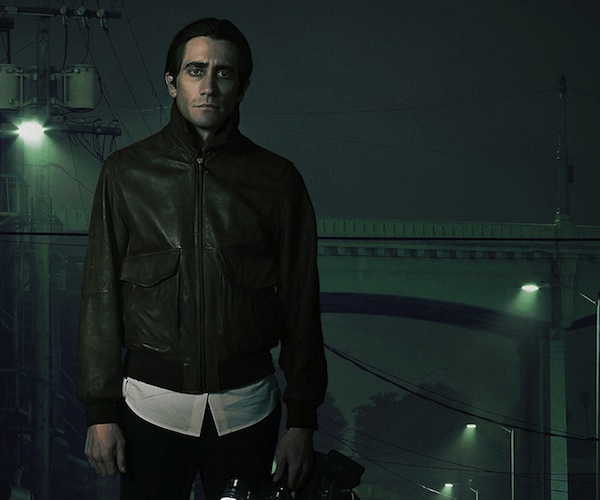Film Review: “Nightcrawler” — A Dark Parody of Getting Ahead
Nightcrawler is a vicious satire of the high stakes required to survive in an American free enterprise system where losers are kicked to the curb and winners take all.
Nightcrawler, written and directed by Dan Gilroy. At cinemas around New England.
By Tim Jackson
As Nightcrawler begins, Lou Bloom is stealing scrap metal to sell for cash. He then has the nerve to ask for a job from the very man who is buying his own scrap back. Bloom doesn’t seem to have a clue that it might be a conflict of interest, considering that the man knows that the goods were pilfered. In fact, Bloom doesn’t have much of a clue about anything to do with propriety or ethics or dealing fairly with the human race, which makes him perfect for a job that entails shooting the grisliest and bloodiest crimes and accidents for television news. In Dan Gilroy’s dark comic first film, a gaunt and hungry-looking Jake Gyllenhaal invests Bloom with a creepy charm, but there is nothing behind those inquisitive raccoon eyes. He hustles his way into a job wandering the city with a camera, on the hunt for the most sordid images he can find in exchange for a buck.
Delectably smarmy, Lou pushes his way into a newsroom run by Nina Romina (Rene Russo), who quickly sees how his ‘bleed and lead’ images will energize the broadcast — garnering the kind of big ratings that will boost her career. Soon Lou hires a desperate and unemployed young assistant Rick (Riz Ahmed) for what he now calls his ‘company.’ Poor Rick can’t begin to keep up. With his cat’s grin and eyes staring like two unblinking cameras, Lou plays the role of employer with all the guile he had when he was looking for job. His savvy at bargaining is quick, assured, and relentless. Rick will be an intern.
Meanwhile, Lou pushes for increasingly higher fees from the station. He is like a wage robot programmed by Dale Carnagie and motivational courses. He knows what moves to play and all the right slogans to spout when bargaining a deal or wearing down his gullible intern. His demeanor exudes the icy charm of Anthony Perkins’s Norman Bates. There’s no biographical or psychological backstory, so he becomes a vicious parody of the high stakes required to survive in an American free enterprise system where losers are kicked to the curb and winners take all. Without scruples or mercy, he does whatever he can to get the footage and the story. He hard bargains the price for his ‘work’ and hustles his boss, Nina, for a dinner date. “I like older women” he declares to her as though he were sampling from a tray of aged cheese.
Russo’s performance is subtle and believable. She convinces us that Nina is an experienced woman, used to being in control, who is confounded that her power may be slipping away. She needs ratings badly, and Lou has done his competitive research. He knows what he can bargain for and that she will pay, with her body and dollars. But this tangled relationship is about more than seduction; it is about the exchange value of goods and services for money and reputation in unscrupulous times. You will recognize the character types, and be all-too-familiar with the lessons Nightcrawler preaches. The audience laughs at Lou’s audacity and then hunkers down in silence. This is a story without an epiphany; it is a grotesque picture of the state of being in our pressurized capitalist economy.
Dan Gilroy produced this film with his brother Tony Gilroy, the director and writer of Michael Clayton, Bourne Legacy, and many other films. The editor is the director’s twin brother John, who also edited Tony Gilroy’s last three films. The brothers also make use of the enormous talents of cinematographer Robert Elswit (Good Night and Good Luck, There Will Be Blood) and the composer James Newton Howard (Hunger Games and many more). Dan also is married to Russo. The collaboration of all these talented people has resulted in a great-looking thriller that encourages the actors to take the time to savor their roles. Glamorous nighttime Los Angeles has never looked so seedy. The soundtrack stretches from orchestrations to scratchy electric guitar. The action is classy and the dialogue smart. Hollywood has generated a number of these enigmatic bad guys, from Andy Griffith’s megalomaniacal Lonesome Rhodes in A Face in the Crowd and Kirk Douglas’s corrupt reporter in Ace in the Hole to Raymond Chandler’s Bruno Antony in Strangers on a Train. Lou Bloom is a member of that self-destructive breed: hard to forgive, difficult to understand, but definitely one of us.
As Lou says with a smile: “I’m a hard a hard worker, I set high goals, and I’m told I’m persistent.” Didn’t one of my student interns just say that to a prospective employee? Oh, dear.
Tim Jackson is an assistant professor at the New England Institute of Art in the Digital Film and Video Department. His music career in Boston began in the 1970s and includes some 20 groups, many recordings, national and international tours, and contributions to film soundtracks. He studied theater and English as an undergraduate and has also has worked helter skelter as an actor and member of SAG and AFTRA since the 1980s. He has directed a trio of documentaries: Chaos and Order: Making American Theater about the American Repertory Theater, and Radical Jesters, which profiles the practices of 11 interventionist artists and agit-prop performance groups. His third documentary, When Things Go Wrong, about the Boston singer/songwriter Robin Lane, with whom he has worked for 30 years, has just been completed. He is a member of the Boston Society of Film Critics. You can read more of his work on his blog.

